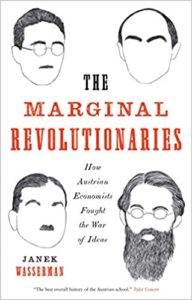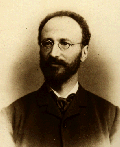I recently reviewed Janek Wasserman’s book The Marginal Revolutionaries: How Austrian Economists Fought the War of Ideas for EH.net, the website of the Economic History Association. I enjoyed the book, which offers a very engaging history of the Austrian school of economics.
One thing I appreciated about Wasserman’s book was his description of the contentious debates that Austrian economists had in Vienna, especially their debates with Marxists. I was especially intrigued by Wasserman’s discussion of debates between Austrians and Marxists regarding the causes of imperialism.
When we think of Marxist analysis of imperialism, we often think of Vladimir Lenin’s Imperialism, the Highest Stage of Capitalism. But Lenin’s analysis was heavily influenced by an Austrian-born Marxist named Rudolf Hilferding. And as Wasserman explains, Hilferding’s influential book Finance Capital was shaped by his debates with Austrian school economists:
“In the confines of the Böhm seminar, Hilferding fleshed out the core arguments of his magnum opus. The book bears the imprint of repeated exchanges with Schumpeter and particularly Mises. Hilferding introduced Finance Capital as an inquiry into money and capital. Only by examining the “processes of concentration” that eliminate free competition in industry and the ever-closer relationship of bank and industrial capital—which he calls “finance capital”—can one grasp the contours of “the current phase of capitalism,” with its cycles of boom and bust. He also offered a penetrating observation about the connection between finance capital and imperialism. Because of capitalism’s need for continued expansion, and the industrial and financial sectors’ desperate quest for profits, capitalists constantly sought new sources of raw materials, new markets for goods, and new sites for capital investment. This tendency led to larger and larger empires, based on economic imperatives but sustained by political and military force. Contrary to liberal apologists, Hilferding rejected the idea that capitalism was inherently pacifistic; capitalist expansion came at the tip of a bayonet.”
That’s right, one of the most influential Marxist analyses of imperialism was honed through arguments in Austrian school icon Eugen von Böhm-Bawerk’s seminar.
Was Hilferding right that capitalism leads to imperialism? Major Austrian school economists disputed his claim. Joseph Schumpeter, for example, challenged Hilferding’s analysis of imperialism:
“Like Hilferding, Schumpeter devoted considerable attention to the relationship between capitalism and imperialism, and he acknowledged the penetration of Hilferding’s insight. He agreed that capitalism had a tendency toward cartelization, monopoly prices, aggressive economic and foreign policy, and war. That said, it was political action and not the logic of competition and capitalism that produced those phenomena. He therefore rejected Hilferding’s historical argument about the nexus of finance capital and imperialism: “It is fundamentally false that imperialism is a necessary stage of capitalism. . . . We have seen that imperialistic dispositions are in fact unfavorable for the life form of the capitalist world.” Schumpeter maintained that capitalism tended toward peace.”
While Schumpeter observed many of the same tendencies as Hilferding, he argued that the problem was not capitalism, but political action.
Ludwig von Mises went further still in his challenges to Hilferding. Wasserman explains that Mises’s book Nation, State, and Economy “flipped Hilferding’s argument on its head.” Mises argued that capitalism promotes peace while socialism engenders imperialism and war. As Wasserman puts it:
“Only a liberal capitalist society, he averred, could safeguard civilization from socialism and its authoritarian, imperialistic tendencies. Since socialism required heavy state intervention in the economy, it also encouraged interstate rivalry and violence. Liberalism, on the other hand, engendered irenic relations between individuals based on noncoercive economic exchange.”
Mises saw capitalism as a source of social cooperation and socialism as a system that leads societies down a violent path.
Hilferding, Lenin, Schumpeter, and Mises were all grappling with an important question: what are the causes of war and imperialism? Given the devastation wrought by warfare, political economists of all stripes should continue rigorously investigating these issues.
Nathan P. Goodman is a Postdoctoral Fellow in the Department of Economics at New York University. His research interests include defense and peace economics, self-governance, public choice, institutional analysis, and Austrian economics.




READER COMMENTS
Richard W Fulmer
Jun 23 2022 at 12:16pm
Wikipedia offers what it admits is an incomplete list of the empires that have existed throughout history. Currently, the count is at 263:
List of empires – Wikipedia
Forty of those listed were started before the year 1AD. All but 27 were started before 1776, the year Adam Smith’s “The Wealth of Nations” was published. Of those 27 modern empires, 14 were non-western, non-capitalist polities.
Tell me again how imperialism is a feature of capitalism?
Sela X
Jul 18 2022 at 6:18pm
Thats because it doesnt count modern forms of empire, including the American and Soviet empires.
Mark Brady
Jun 23 2022 at 3:43pm
Two thoughts.
1. Your enthusiastic review of Wasserman’s The Marginal Revolutionaries contrasts with Richard Ebeling’s long and critical review in 2019. What would be your take on that review? https://www.aier.org/article/wassermans-twisted-tale-about-the-austrian-school-of-economics/
2. John Atkinson Hobson’s Imperialism: A Study (London and New York: 1902) was crucially important in the development of both Hilferding’s and Lenin’s analyses of imperialism. Read John Cunningham Woods’s “J. A. Hobson and British Imperialism” (1983) to learn more. https://www.jstor.org/stable/3486245
Liberty Fund offers the complete text of Hobson’s book here: https://oll.libertyfund.org/title/hobson-imperialism-a-study
Thomas Lee Hutcheson
Jun 24 2022 at 10:36am
“Because of capitalism’s need for continued expansion, and the industrial and financial sectors’ desperate quest for profits, capitalists constantly sought new sources of raw materials, new markets for goods, and new sites for capital investment.”
Of course, but why would that lead to imperialism instead of just free trade?
Comments are closed.